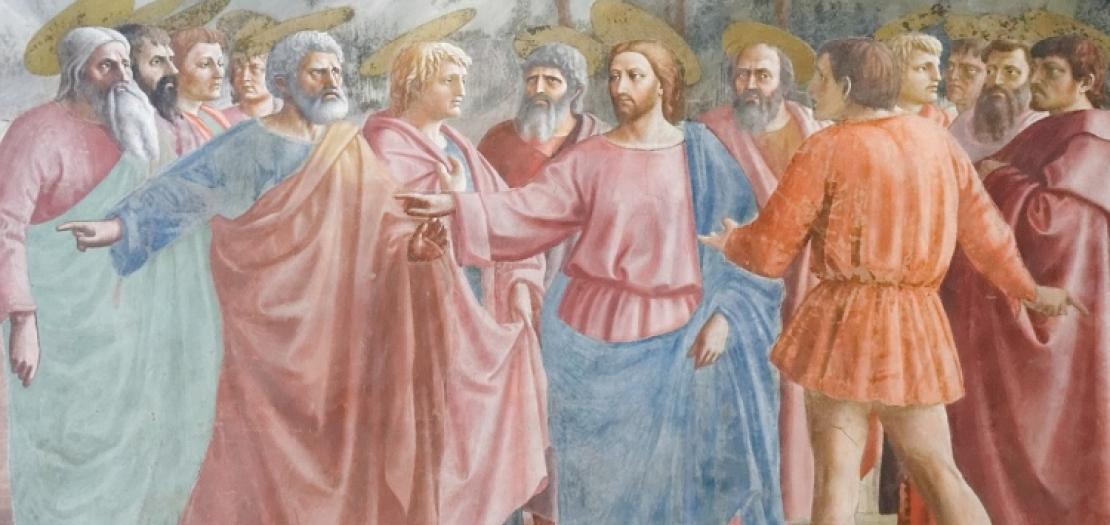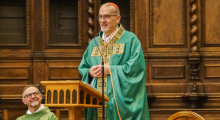Issued by the Catholic Center for Studies and Media - Jordan. Editor-in-chief Fr. Rif'at Bader - موقع أبونا abouna.org

The context of the Gospel we read today (Lk 10:1-12,17-20) is that of Jesus’ journey to Jerusalem.
A few verses earlier, the evangelist Luke reports that Jesus makes the firm decision to set off for Jerusalem (Luke 9:51) and immediately sends his disciples off to prepare for his arrival from village to village (Luke 9:52). Luke had also already reported on the first mission of the twelve in chapter 9, (Luke 9:1-6) so one might think that this is something particularly important for the evangelist.
Let us first turn to the opening verse, where we read that the “the Lord appointed seventy-two others whom he sent ahead of him in pairs to every town and place he intended to visit.” (Luke 10:1)
In the text, Jesus explicitly says that his disciples were to go and announce his arrival (ahead of him in pairs to every town and place). The mission of the seventy-two therefore has no other purpose than to announce the coming of the Lord. This is the content of the proclamation that reaches everyone with the good news that the Lord is coming.
This is the central element of today’s text. The mission of the Church is necessary, but not because it produces something, not because it has something to offer, not because it can solve the problems of humanity. It is central simply because it is called to go everywhere and say that there, right there, the Lord is coming. And this announcement must be made in a very special way, because only then will the Church be a sign, a foretaste of what will happen. It will then no longer be so important what it does. The content will always be the same: the coming of Christ in the world, his presence. What Jesus is referring to and what is important is the way in which this announcement will be made. That will be what Jesus attaches the most importance to.
We can only recognize a few traits of this manner, of this style.
The first attitude with which the disciples will announce the coming of the Lord is meekness: the disciples are sent like lambs in the midst of wolves (“I am sending you like lambs among wolves” - Lk 10:3). The disciples are free from the illusion that evil can be overcome through coercion and violence.
Disciples are also free from all forms of power and do not impose anything, not even peace (“Into whatever house you enter, first say, “Peace to this household.” (Luke 10:5)
They offer it to everyone, but if peace is not accepted, the disciples do not judge, they do not accuse, they do not wage war. They keep peace within themselves “If a peaceful person lives there, your peace will rest on him; but if not, it will return to you” (Luke 10:6) so that it is not lost and so that they can offer it again in the next house they enter.
Then the disciples are sent out two by two “he sent ahead of him in pairs”. (Luke 10:1) Mission is not a solitary event, but always a fraternal event. And this is because the salvation that the Lord wants to bring to all people is first and foremost a liberation from selfishness, from loneliness. You walk together with a brother because salvation for everyone happens through relationship, encounter and friendship. In brotherhood, we learn to no longer live out of ourselves.
Finally, the mission of the disciples is characterized by joy (“The seventy-two returned rejoicing.” (Luke 10:17) A very special joy, because it does not depend on the results of the mission.
Rather, the disciples return happy because they have seen with their own eyes the victory of good over evil (“Lord, even the demons are subject to us because of your name”. (Luke 10:17)
Jesus confirms this “success” of his people’s mission, but he also leads them on. Their joy must not depend on how well they have done. For that would be to appropriate the work that the Spirit has done through them (“subject to us because of your name”). The disciples’ joy - Jesus says - should be the result of the gift of a love the have experienced personally, as personal as each one’s name is (“but rejoice because your names are written in heaven”. (Luke 10:20) A love that remains as what is written in heaven remains with God. A love that is constant, faithful and eternal, as constant and faithful as the Father in heaven is. Now, the mission of the disciples is to become witnesses of another joy.
So, the protagonists of this mission are not the disciples. The protagonist is grace, the love of God, which is a free and gratuitous gift. The Church will therefore have to do just that: announce the presence of Jesus, his coming, and it will have to do so free of human constraints and criteria, so that he can be received in the same freedom by people of all times.
+ Pierbattista







